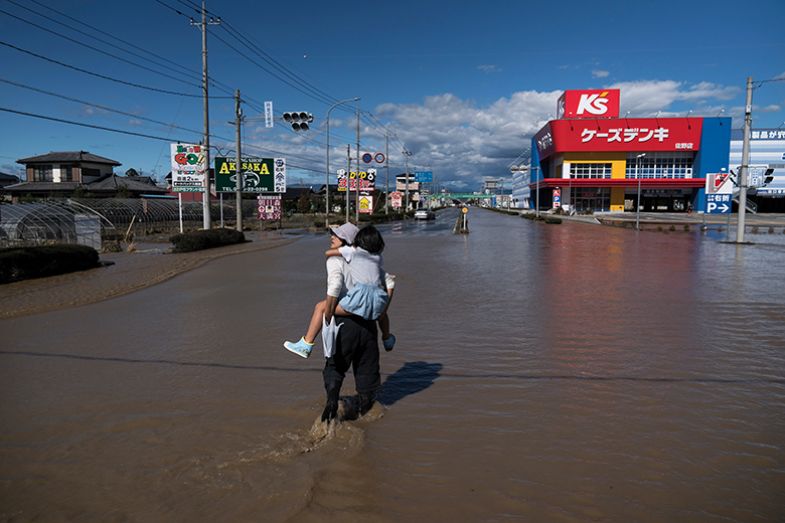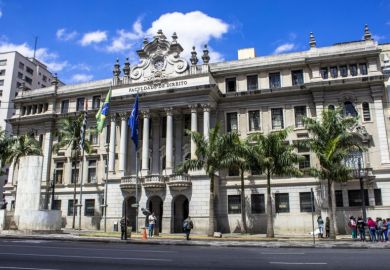The World University Rankings 2023 are out now
How do we prepare students for an unpredictable future? This question challenges higher education in the face of ongoing domestic and global crises. Since assuming the presidency of the University of Tokyo (UTokyo) in 2021, I have watched as new challenges posed by such threats as climate change, the Covid-19 pandemic and the war in Ukraine have forced us to rethink the role of higher education in society.
Such crises are beyond the scope of any single individual or organisation to solve. To address them, universities must critically re-examine the people that we serve, how we teach and the roles we play in a constantly shifting world. UTokyo seeks to reimagine the university as an institution that serves the global public by nurturing diverse and talented individuals who can provide creative solutions to world problems.
But we are not only focused on global crises. There are also domestic problems that we must urgently address. In Japan, universities are facing difficulties caused by declining numbers of younger people. With the fastest ageing and shrinking population in the world, the country needs to move beyond an exclusive focus on traditional university education.
First of all, we still need to foster the younger generation with the advanced knowledge and skills that will be required to maintain the country’s economic productivity. At the same time, we need to create an environment that welcomes students from a variety of backgrounds. One way I hope to do this is by expanding opportunities for international students to study at UTokyo. We plan to significantly increase the number of courses taught in English for undergraduate students of all levels. In fact, through the Global Science Course Transfer Programme in our chemistry department, it is already possible for transfer students to enter in the third year and complete their degree entirely in English.

That being said, we would also like students who have decided to study in Japan to acquire some degree of Japanese ability. After all, learning other languages is fundamental to fostering cross-cultural understanding. When I consider the specialties of our faculty, I know that UTokyo has the potential to provide instruction and expertise in many languages. I hope to use this potential to ensure that UTokyo becomes a place where people can come to learn in a rich linguistic environment.
Universities have an immense potential to serve wider portions of society if we innovate new kinds of learning for students of all ages. We can also support non-traditional students through continuing education and reskilling, enabling them to return after graduation to learn a new specialty. For instance, our subsidiary, UTokyo Extension, has been operating a data science school for about three years. Because of the high demand for skills in this area, we have also established a Mathematics and Informatics Center, which operates as a university-wide collaborative research organisation through which programmes are devised and offered by faculty with input from industry professionals.
Industry-academia collaboration is an important way in which universities can provide students with the tools to flourish in society. Since 2019, our undergraduates have had the opportunity to take part in the UTokyo Global Internship Program, one of many collaborative efforts between the multinational air-conditioning manufacturer Daikin Industries and UTokyo. Through this programme, students from any academic discipline can spend a short period at Daikin’s overseas locations to acquire international experience and practical business training at the same time.
For students looking to start their own businesses, UTokyo offers a wide range of support, including training through the UTokyo Entrepreneur Dojo, as well as monetary support through a number of programmes and industry connections. Today, many students enter university wanting to solve social issues, and our university has the resources and connections to get them started.
Another prominent initiative is the recent launch of the Smart City School. As the planning and building of our future cities require expertise and practical knowledge in a variety of fields, this school is designed to nurture talented future leaders in urban and regional development.

It is also critical not to understate the importance of the liberal arts and social sciences to the kind of cross-disciplinary efforts we need for the near future. Climate change and global health crises are not solved by technology alone; we also need to understand the social systems and historical circumstances behind them in order to find workable solutions. But, in Japan, the artificial division between the sciences and the humanities in education begins early. To address this, industry body the Council on Competitiveness-Nippon has launched a programme to create a platform for STEAM (science, technology, engineering, arts, and mathematics) education from elementary through high school. The programme is supported by educational institutions and industries throughout the country, and UTokyo is looking forward to taking part.
Our commitment to interdisciplinary solutions is also evident in the recent establishment of our Center for Global Commons. Its goal is to promote the transformation of society by mobilising a broad spectrum of decision-makers to search for ways to safeguard the Earth as humanity’s common property. It is developing a framework of global commons stewardship through interdisciplinary approaches.
UTokyo has also begun a project called “Spring GX”. This training and financial support programme allows doctoral students in all fields to explore solutions to global environmental issues through the lens of their own research expertise.
Education can be a truly international and interdisciplinary activity. The issues we face today are complex and multifaceted, so they require creative solutions. In order to find those solutions, we must foster diverse voices by making the university a place to which anyone can belong.
I believe that it is through dialogue that we can create the new trustful connections and knowledge that will ensure the well-being of all, even in an unpredictable future.
Teruo Fujii is president of the University of Tokyo.
POSTSCRIPT:
Print headline: A path to learning for all
Register to continue
Why register?
- Registration is free and only takes a moment
- Once registered, you can read 3 articles a month
- Sign up for our newsletter
Subscribe
Or subscribe for unlimited access to:
- Unlimited access to news, views, insights & reviews
- Digital editions
- Digital access to THE’s university and college rankings analysis
Already registered or a current subscriber?








